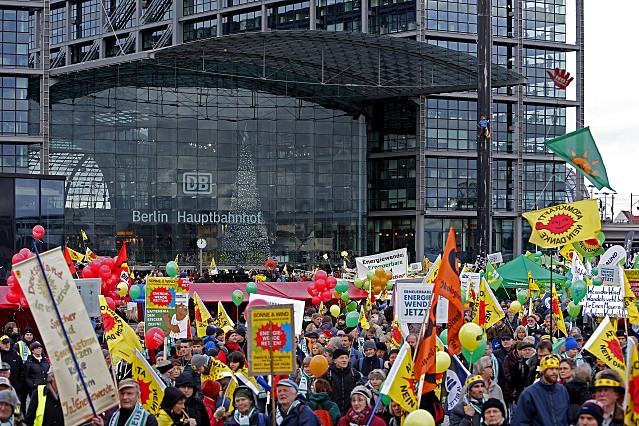Single News
Protesters demonstrate against energy U-turn
BERLIN (NNA) – Demonstrators in Berlin formed a human chain around the the German Chancellor’s Office on 30 November in protest at the planned energy policy of the new German coalition government. Organisers say some 16,000 people joined the protest against proposals which would see Germany dramatically slow down its commitment to renewable energy. Protesters also flew kites in front of the parliament building on which people from all over Germany had written their energy policy demands.
Following elections in September, the centre-right grouping of Christian Democratic Party (CDU) led by Chancellor Angela Merkel and its Bavarian sister party the Christian Social Union (CSU) has been in negotiations with the centre-left Social Democratic Party (SPD) to form a so-called Grand Coalition after the CDU’s traditional coalition partner, the liberal Free Democratic Party (FDP) failed to get back into the federal parliament.
The organisers of the protest see the new coalition agreement between the CDU/CSU and SPD as a “frontal attack” on the current energy policy of transition to renewables. They call on the Grand Coalition to send fracking, coal and nuclear power “to the scrap heap” once and for all. A commentary in the respected German newspaper Die Zeit headed “Energy transition bye-bye” described the coalition agreement as a “disaster” as far as energy was concerned which meant that Germany had abandoned any claim to be a model in this field.
Some 60 environmental and campaigning organisations and groups had called for the rally, including the anti-nuclear organisation “ausgestrahlt”, the campaigning network Campact, NaturFreunde Deutschland, Attac und the Federal Association of Citizens’ Initiatives for Environmental Protection (Bundesverband Bürgerinitiativen Umweltschutz).
They criticised the coalition agreement between CDU, CSU and SPD as having wasted a huge opportunity of making serious progress in the energy transition to protect the climate, switch off nuclear power and ensure that energy supplies were in citizens’ hands. There have been several campaigns in Germany – successful in Hamburg, narrowly unsuccessful in Berlin – to return energy supplies to communal control.
Jochen Stay, spokesperson for the anti-nuclear organisation “ausgestrahlt” said there would be larger protest actions if the new federal government persisted with the current policy. Christoph Bautz, chief executive of the campaigning network Campact, criticised the cap being put on renewable energies: “After photovoltaics, wind power is now in the firing line – and thus of all things the most economic pillar of the energy transition.” Instead, the new coalition was placing its eggs in the basket of coal-fired power and wanted to use subsidies “to prevent old coal-fired power stations from being finally mothballed”. It was also conducting “client politics in favour of major energy companies RWE, Eon and Vattenfall”.
Jens-Martin Rode from the “Energy, Climate, Environment” working group of the Attac network pointed out that the battle in society for a democratic, ecological and social energy supply had reached the mainstream of society and was supported by a broad spectrum of citizens.
END/nna/ung/cva
Item: 131212-02EN Date: 12 December 2013
Copyright 2013 News Network Anthroposophy Limited. All rights reserved.

